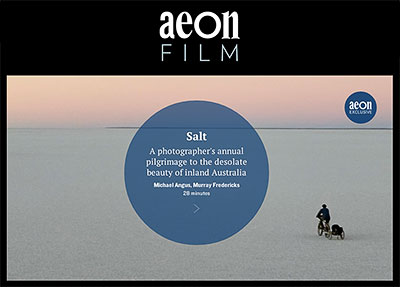Murray Fredericks reminds me of myself far too much. Whilst watching his 28 minute movie about photographing lake Eyre in Australia, I saw not only a landscape that is very close to what I have experienced on the salt flats of the Bolivian Alitplano, but also a photographer obsessed by the same thoughts that I often have during my trips to remote places.
I love large vast expanses of 'nothingness'. I'm enthralled by the Salar de Uyuni salt flat of the Bolivian Altiplano in the same way that Murray is captivated by lake Eyre. You should definitely watch this movie. His images are absolutely worth waiting for the very end of the movie for.
I saw so many parallels with my own experiences whilst watching this movie.
For example, Murray notices that after a short while the exotic nature of his landscape tends to subside. This is something I've experienced and I tend to find I can only truly understand a place I've been to, once I'm back home. It seems that being home gives me a reference point, one where I can consider and notice the contrasts to where I have just been.
He also notices in his movie just how the smallest of noises like the sound of brushing his teeth seem to be amplified. This also goes for his thoughts. He finds that it's all too easy to get stuck in some mad part of his brain and before he know it, he's digging himself into a downward spiral. I know this, because big empty spaces do this to you - they act as a massive reflective board that just bounces all the stuff that's going in in your mind right back at you.
You can't go somewhere where there is nothing to occupy your mind if you have issues. Issues just get amplified. I was speaking to a good friend of mine who lives in the Lofoten Islands and I was telling her about an american photographer that I know, who would love to move there. She said to me 'it's not for everyone, all this space and silence tend to amplify any issues that you have'. It seems that going somewhere with a lot of space doesn't give you a chance to run away from your problems - it just gives them a platform for them to stare right at you.
Murray also notices memories that surface - of people he hasn't known for years. I found this to be the case also. During my very first photographic outing to Iceland back in 2004, I spent a month in a tent, often for days on my own. I found this time to be extremely cathartic for me - it was a time in my life where I'd never had the luxury to have so much time to consider and reflect with no distractions. I felt I had a bit of a mental clear-out. I found my mind returning to thoughts of old school friends that I had lost touch with decades ago. It was surprising for me to find myself thinking about people I'd thought I'd forgotten about, and events that I didn't know I still had memories of. I considered later that these thoughts are always present, but they get buried under the noise of everyday life.
But the biggest message of this movie is this: you can't force things to go your way.
Murray says at one point that he wishes the landscape would cooperate with what he want's to get out of it and realises that all he's doing is pitting his ego against the climate.
So often I feel that as photographers, most of us turn up somewhere and try to 'will it' to be something that it's not and when it doesn't live up to our expectations, we become discouraged.
Photography is not about forcing things. Nor is it about deciding what it should be and discarding it if it doesn't conform to our wishes.
Photography is really the act of submission. It's about seeing the beauty in what's there and working with what you're given. You'll have more chance of capturing something if you're open to whatever comes your way, rather than hoping for something specific.
This is a really great short-film. I'll be watching it again and again, just for the philosophical observations. But if that's not for you, then watch it at least for the very stunning wondrous photographs towards the end.

